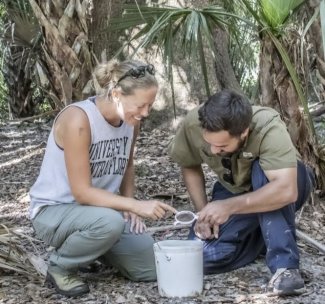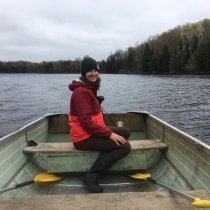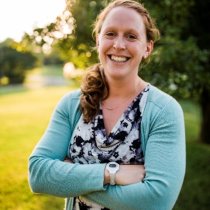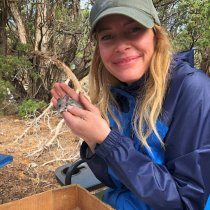Spotlight
Women in Ecology – Roisin Stanbrook
June 9, 2021
While nearly everyone can appreciate the beauty of the great outdoors, that feeling doesn't always apply to the tiny critters that inhabit it, especially insects. While some people find bugs to be scary or gross, Dr. Roisin Stanbrook, a postdoctoral research fellow at the University of Central Florida, hopes to change that perception by showing how insects are critical to the conservation of our natural world.
In addition to detailing her fascinating work with dung beetles that landed one of her discoveries in a display case alongside specimens found by Charles Darwin, Stanbrook discussed how her non-traditional path to conservation ecology is an asset in the long run, and how she hopes to teach her students the same. As we've seen many times during the Women in Ecology series, there is no one path to a career in ecology, and sharing experiences that differ from the norm can be a great asset to early career scientists and those curious about joining the field.
Q: How did you get into your current field?
I grew up in rural Ireland, and we had a woodlot at the back of our house and a huge bog at the front. My brother and I used to be let out of the house in the summer with an apple and a cheese sandwich and we didn't go home until it was dark, so we used to spend a lot of time wandering around in the forest. At one point when I was growing up there was a team of scientists that came from somewhere abroad – I just remember that they weren't from Ireland – and they were doing research on the bog, and they found a particular endemic lichen growing there. This was really exciting for all the school kids, and as soon as they were gone we'd be out in the bog trying to find things too, even though we weren't sure what we were looking for. We'd play scientists and investigative discovery, and it really opened my eyes that this was something you could actually do for a living.
Q: Can you share more about your career path from college onwards?
Well, it wasn't linear at all. I didn't really know what I wanted to do when I graduated high school, and there was a huge push at the time to get into computer software and coding, so I decided to try that. I did that for my first year at college and I realized really quickly it wasn't for me, and I dropped out. I needed to find a job, so I became the manager of a pet shop because I wanted something that had to do with nature and animals and that was an outlet. But it was pretty rough, so I decided to try and find something else, and I saw an ad for a night school program, run through the company I was working for, to do conservation outreach.
Through that program, an opportunity came up to go to South Africa for six months and work on a conservation project there, and I felt like I found what I really wanted to do. So I got on the plane and I went, and as soon as I got there and I realized that it was possible, everything clicked. Before I even left South Africa I applied to go back to college in the UK to do wildlife biology at the University of Salford.
From there, it just took off. I had so many good mentors at the University of Salford that let me find out what I wanted to do, and they encouraged me to apply for a Master's. I went on to do my Master's at Manchester Metropolitan University and from there I did my first foray into conservation biology, which is what my degree is in, and that's where my love of dung beetles came from!
I did my Master's fieldwork in Tanzania, and I remember my supervisor came to me and said they could tell I was obviously very enthused with the work, and they invited me to join them on a project they were working on in Kenya to do my Ph.D. fieldwork there. Without a second thought I agreed, so I did my research based in a particular national park in Kenya – the Aberdare National Park – and focused on dung beetles and factors that impact their abundance and their impact on ecosystem services. Once I finished my Ph.D. in 2018, I took a fellowship at University of Central Florida.
It hasn't been the linear trajectory that many folks do, but I've experienced lots of other things outside of academia that have really helped me. I love telling my students about my path because everyone is so stressed about the next step, and I tell them eventually it will work out. It may be rough for a couple of years, but just breathe and you can make it work.
Q: During your time in school and your previous jobs, were there any specific people who mentored you or influenced your career path?
There definitely were people who influenced my path, but surprisingly none of them were women. I've been fortunate to have really supportive male mentors like my Ph.D. supervisors who would listen when I walked into their office and said "I have this idea…"
The person who actually set me on the path toward dung beetles and gave me the confidence to feel like I knew what I was doing was a man at the Oxford University Natural History Museum, Darren Mann. I spent quite a lot of time at the museum, walking around all of the collections, and he took me under his wing and provided me a place to stay, very strong coffee, and all the books that I needed without charge. One of the first species I ever discovered he put in the same case as one of Darwin's discoveries.
Q: What challenges do you think women face when entering STEM fields?
A lot of my early career research focused on extensive field work in remote locations, and often I felt like I needed to go through more health and safety steps than my male colleagues. It tends to be reinforced by the role models that are out there. If you want to be a field ecologist and go to all these places, there's almost like an Indiana Jones-type view of it, where a man walks into the forest with just a knife and his wits and that's all he needs to survive, and that's what a lot of young women see, that you have to be that type of person because that's what's portrayed in nature documentaries. How often do you see a nature documentary fronted by a woman? It's always an older white man walking into the forest. You never see the back-up crew behind him, and that's the standard that's pushed.
In conservation biology, where you have a really close interface between sociology and conservation, I think at a bare minimum we need to be mirroring our society, so it's not just all men or only white men that do this. That would make things more approachable and less intimidating to women, and relevant to the wider public as well.
Q: What specific steps can academia take to inspire women to get into STEM roles, but also retain female professors?
Obviously I'm going to say paid maternity leave! It would just make such a huge difference. Paid maternity and paid paternity leave, so it's not just all on women to take that time, but men can take it too.
These are all very cliché things, but we need to have actual, visible female role models in all strata of conservation, NGOs, or in academia. We need them from the top to early career researchers, and need those women to not be afraid to actually share what they've experienced, and how things have changed – give the positive as well as the negative. We could be so many other places than where we are now.
Q: What work are you most proud of in your career?
I'd have to say the work I did during my Ph.D. I think for many people that's the case because you have such time to be creative and such latitude is given. You feel for the first time that you're actually contributing to something independently.
When I got the opportunity to go to Kenya, I was so excited. Through that I got to visit and document things that hadn't been recorded before, and very few people are lucky enough to have the opportunity to do that. I got to discover a new species of dung beetle up the side of a mountain. Then I decided one day after doing a bit of research that no one had ever looked at the chemical composition of elephant dung, so I got it in my head that there was a niche to be filled. I wrote a paper looking at that, and it's actually one of my most cited papers! Just being able to have that latitude to do what I wanted has been great.
Q: What do you hope your research goes in the future?
As a conservation biologist, and someone who has an interest in insect conservation, for me, discovering why insects are declining at such an alarming rate is the question I want to answer with my career. Obviously it's a complex question, and there are many factors involved, but if I can even contribute in some small way that would be something that I would be so happy to achieve. We know next to nothing about why insects are being lost in many locations, and in some locations they're out of control in terms of abundance. But we do know that in general, overall biomass is being lost, and I'd like to get a handle on that.

Roisin Stanbrook in the field with one of her students
Concurrently, I'd like to raise awareness with the general public about what this actually means and what people can do about it, from the individual who sets aside a tiny portion of their backyard to plant native wildflowers, to driving government policy on a huge scale. It's going to get to the point in the not-too-distant future when we're going to reach a tipping point, and now is when we can do something about it, so now is the time we should all act. With the work I'm currently doing at UCF, we've found that dung beetles are regionally extinct on all the ranch lands, and we're trying to figure out when that started and why.
Q: Why do you think the issue with insect population loss isn't more well-known?
There's an "ew" factor. I do Skype a Scientist with grade school kids, and some of the questions they ask are just brilliant, like "Do dung beetles wash their hands after they go to the toilet?" So I want to lessen the "ew" factor and show that insects are so cool, they're amazing, and you don't need to jump away when something is buzzing toward you.
Q: What is the most satisfying part of being an ecologist?
Working with young kids and doing outreach, as well as working with students here at the university. It can be really challenging, but just to have that lightbulb moment, when you can see someone really understands something for the first time, really makes it worthwhile. And hopefully they're then going to go out and disseminate that knowledge too.
Q: What is the most challenging part of being an ecologist?
Having the time and money to actually do the research. Finding the time to write grants and to have the funding resources to answer those important questions is the biggest challenge. But I love all of it. I'm so privileged to be able to do what I do. To have those small "aha!" moments, which then make up for those frustrating moments… it makes all the difference.
Q: What is the most alarming discovery you've made?
We've discovered that dung beetles are in decline in both urban and rural habitats in central and south-central Orlando, in a place where they should be thriving. In Florida we're losing a hundred thousand acres of natural lands a year for housing at the moment. There are a thousand people a day moving to Florida, and everyone needs to be housed, and then you need roads and other infrastructure, and you can understand it. But we're losing habitat at an alarming rate because of that level of development. On ranchlands the density of cows is getting higher because better fertilizer means more grass so you can put more cows on the land. The result is the same—habitat is lost because of the amount of land being used for grazing. With this intensity of land usage, habitats start to degrade.
It's really alarming, and it's just a small part of the bigger picture. What we're trying to do in the next six months is put a dollar value on what that decline in dung beetles means to Florida, because we know dung beetles as a whole contribute hundreds of millions of dollars (if not more) a year to the U.S. economy. But to bring it down to the local scale, what does it mean for Florida, and why should people actually care that these beetles - that everyone thinks are just little poop rollers - are going missing?
Q: What is the most promising discovery you've made.
Initiatives like NEON are the most promising. It's the only continental-wide research infrastructure in North America that's been set up to collect this amount of standardized data so we can have a baseline for the trend of ecological change across the next 30 years. And the fact that it's brought so many scientists together to have conversations on what we can do to halt habitat decline and climate change is fantastic. This data is such a treasure trove; the collaborations it's inspired and the access that it's given to everyone is a real boost to conservation in America as a whole. I form part of the ground beetle working group,which determines targets for sampling that generate data that can reveal significant changes in beetle abundance, diversity, and community composition. There are currently eight of us that are doing this work, and we've brought so many different ideas together and it's just been amazing to have this network.



